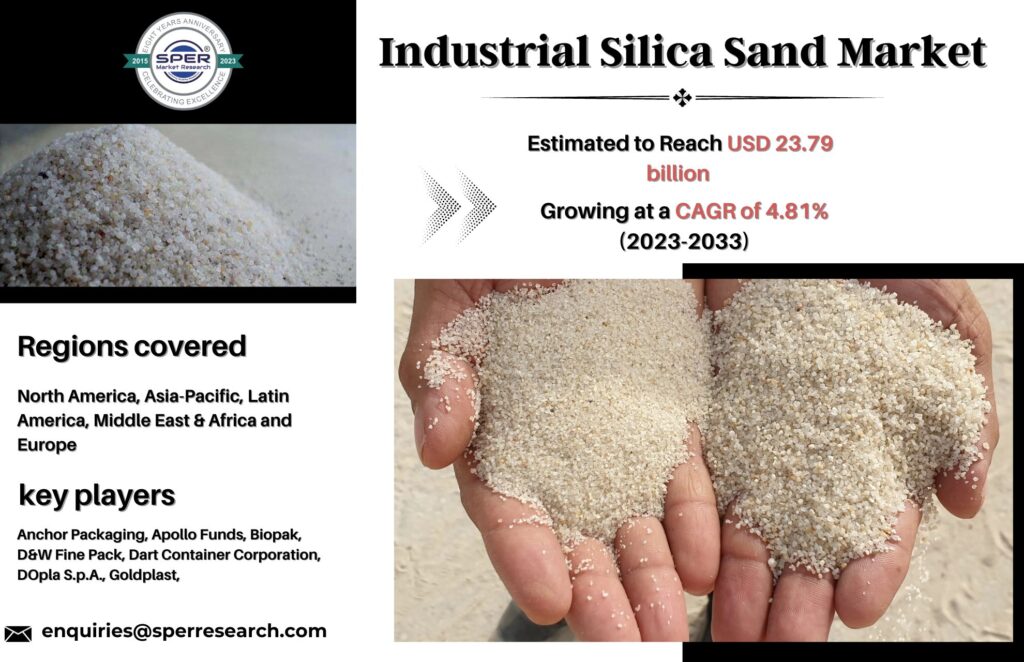Silica sand is one of the most widely distributed types of sand in the world. It is sometimes referred to as quartz sand, white sand, or industrial sand. The production of glass and metallurgy both depend heavily on industrial silica sand.
According to SPER market research, ‘Industrial Silica Sand Market Size– By Type, By Particle Size, By Application, By End-Use- Regional Outlook, Competitive Strategies and Segment Forecast to 2033’ state that the Global Industrial Silica Sand Market is predicted to reach USD 23.79 billion by 2033 with a CAGR of 4.81%.
The major nations of the globe have increased their efforts to fortify their infrastructure in recent years. As a result, construction activity has grown significantly everywhere in the world. Because of this, the construction industry is anticipated to provide enormous demand channels for the worldwide industrial silica sand market. One of the essential ingredients in the production of glass is thought to be silicon dioxide. A considerable amount of this component can be found in industrial silica sand. Consequently, there is an increasing need for industrial silica sand among businesses involved in the glass manufacturing industry. This element is supporting the growth of the industrial silica sand market globally. In addition, the oil and gas sector makes extensive use of industrial silica sand. Therefore, it is anticipated that in the upcoming years, the oil and gas industry would present profitable opportunities for the industrial silica sand market.
Request For Free Sample Report @ https://www.sperresearch.com/report-store/industrial-silica-sand-market.aspx?sample=1
The construction industry faces numerous challenges due to unreliable sand supply, price fluctuations, and variations in sand quality. These issues have prompted a search for alternatives to traditional sand. Some of these alternatives include manufactured sand (M-Sand) and sand-free plasters. The demand for cost-effective and environmentally friendly methods for producing M-Sand is increasing due to stricter environmental regulations aimed at conserving riverbed resources. Sand-free plasters are also emerging as a substitute for silica sand. Traditional plastering methods involve multiple steps like buying and sieving sand, which can be time-consuming and result in material wastage. Sand-free plaster offers consistent quality while reducing labour costs and workload. The adoption of these substitute materials and techniques in the construction industry, aimed at resolving the problems associated with silica sand, may hinder the growth of the global silica sand market, particularly in developing countries where urbanization is an ongoing process.
Impact of COVID-19 on Global Industrial Silica Sand Market
Furthermore, the industrial silica market is expected to be greatly affected by the coronavirus disease (COVID-19), which is already having an influence on the world. In terms of the global economy, COVID-19 might have three main effects: it could directly damage demand and production, disrupt supply chains and marketplaces, and have a financial impact on financial markets and enterprises. The COVID-19 outbreak has resulted in flight cancellations, travel bans, quarantines, restaurant closures, restrictions on all indoor events, the declaration of emergency in over forty countries, a massive supply chain slowdown, stock market volatility, a decline in business confidence, growing public panic, and uncertainty about the future.
Industrial Silica Sand Market Key Players:
Geographically, it is anticipated that vendors engaged in the industrial silica sand market will have opportunities for growth in North America. A primary factor contributing to this forecast is the increasing demand from this region’s oil and gas sector. Aside from this, Asia Pacific is predicted to have a significant increase in demand for industrial silica sand. Additionally, some of the market key players are Anchor Packaging, Apollo Funds, D&W Fine Pack, Dart Container Corporation, DOpla S.p.A., Huhtamaki, and Pactiv Evergreen, Others.
Global Industrial Silica Sand Market Segmentation:
By Type: Based on the Type, Global Industrial Silica Sand Market is segmented as; Potassium Silicate, Sodium Silicate.
By Particle Size: Based on the Particle Size, Global Industrial Silica Sand Market is segmented as; Less than 40 Mesh, 40-100 Mesh, Greater than 100 Mesh.
By Application: Based on the Application, Global Industrial Silica Sand Market is segmented as; Building & Construction, Construction Additives, Filter Media, Foundry, Glass Industry, Hydraulic Fracturing, Metal Casting.
By End-Use: Based on the End-Use, Global Industrial Silica Sand Market is segmented as; Building & Construction, Foundry, Glass.
By Region: This research also includes data for North America, Asia-Pacific, Latin America, Middle East & Africa and Europe.
This study also encompasses various drivers and restraining factors of this market for the forecast period. Various growth opportunities are also discussed in the report.
For More Information, refer to below link:-
Industrial Silica Sand Market Future Outlook
Related Reports:
Follow Us –
LinkedIn | Instagram | Facebook | Twitter
Contact Us:
Sara Lopes, Business Consultant – USA
SPER Market Research
+1-347-460-289974



